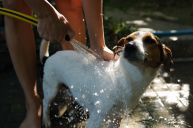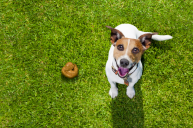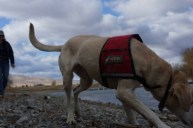After one DJ's dog detects his cancer, he is more than just man's best friend. He is a lifesaver.
DJ Victor Calderone credits the early detection and his cancer diagnosis to his dog, Tuco. The New York City-born DJ announced on his Instagram that he "will be fine," but that the DJ's dog detected cancer by trigging the symptom and giving Calderone the awareness needed to go see the doctor, which in turn landed him in the ER.
He said that he was reluctant to get a dog, but his wife and son "campaigned hard to get one." He continued, saying their rescue dog "came into my life for a reason." He has so much love and gratitude for the pup, which led to his early diagnosis, saying, "I love you more than you know. You are our miracle pup."
The experience is not unique to Calderone. Many dog owners have reported that the first time they realized they were possibly cancer patients, it's because their furry friend had raised a red flag.
How can a dog detect cancer?
RELATED: Dog Does the Cutest Thing to Comfort His Owner in the Shower
Dogs are known for their acute sense of smell. A dog's nose is so sensitive that it can pick up the VOCs that cancer cells give off. According to the American Kennel Club, a dog's olfactory senses are 10,000 to 100,000 times sharper than people's.
It's so sharp that they can smell cancer on your breath, even if it has not progressed throughout your body and is still in a central location. Nonprofit cancer dog training organization In Situ Foundation has 52 dogs training to sniff out cancer cells throughout the world. The dogs are trained for eight months to smell breath, urine, saliva, and plasma samples before working with researchers at hospitals and universities.
The dogs are also being used for earlier detection in California firefighters because firefighters are exposed to so many carcinogens in wildfires, ideal for early screenings, especially since many cancers do not show signs until people are in the late stages of the disease.
What kinds of cancer can dogs detect?
Dogs are commonly trained as detection dogs for law enforcement, finding drugs, bombs, and suspects. However, it is less commonly known that canines are used for cancer detection too. Their introduction into the medical field started in 1989 when researchers used dogs in a melanoma clinic. Their cancer detection duties have come a long way since the late eighties.
Two dogs, Florin, a four-year-old Labrador, and Midas, a seven-year-old Wirehaired Vizsla, were used in a study for Medical Detection Dogs in the UK with positive prostate cancer urine samples and negative urine samples. When they made a correct selection, they got a treat.
Their expert sniffers have been employed to detect different types of cancer, from lung cancer to breast cancer. Some dogs have even been able to sniff out their owner's ovarian cancer.
Can dogs detect other diseases?
Dogs are becoming an invaluable part of the healthcare industry. With the Coronavirus pandemic, dogs are being trained to sniff out COVID by working with sweat samples. The study was so successful that some airports and NBA teams use the trained dogs to detect asymptomatic patients, catching the disease before it transmits to anyone else.
Want to see more amazing things dogs can do? Check out our Wide Open Pets Facebook page!




